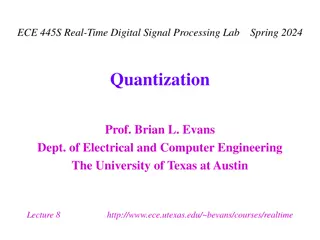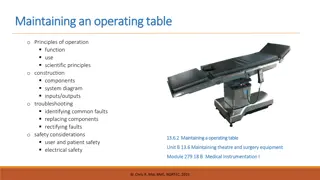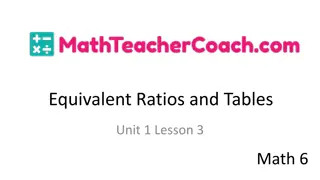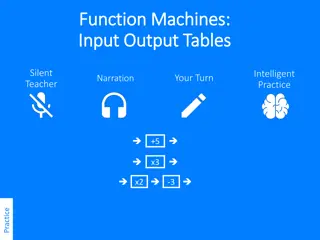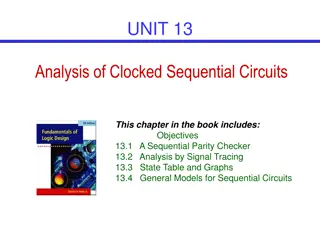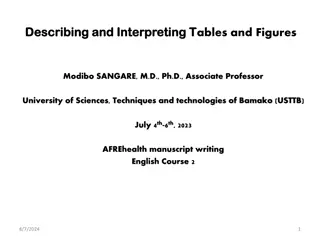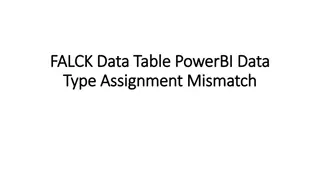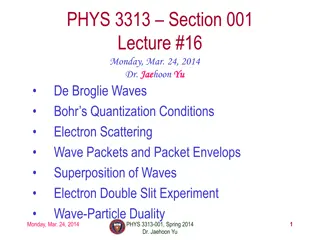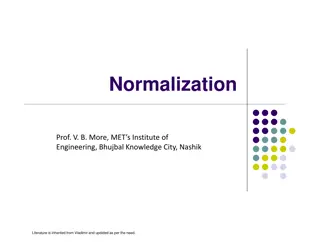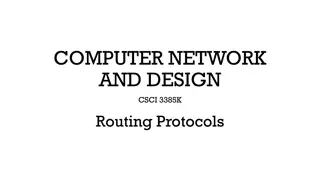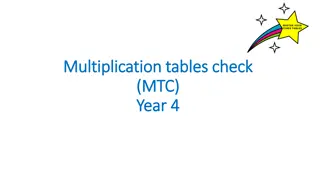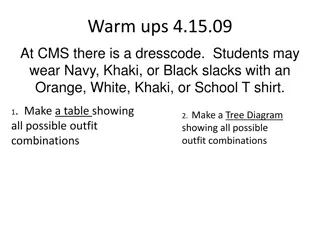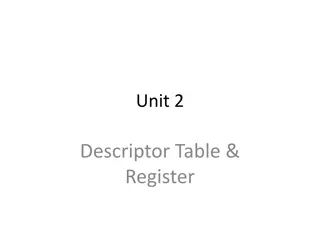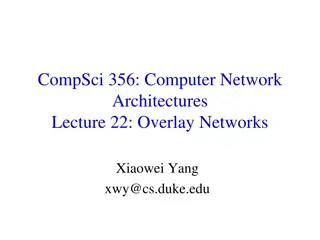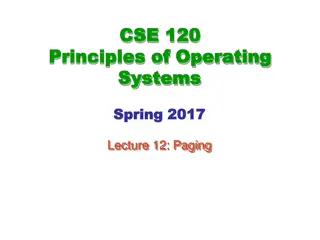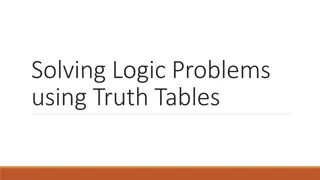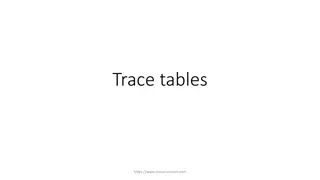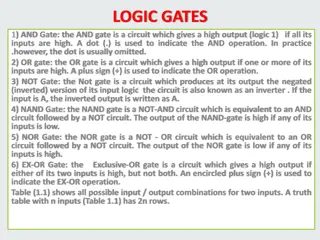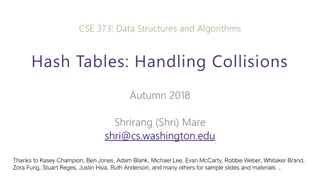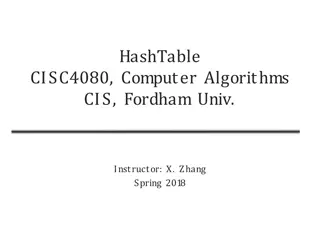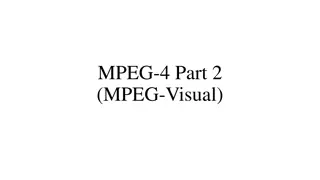Real-Time Digital Signal Processing Lab: Quantization and Resolution Overview
Explore quantization and resolution techniques in real-time digital signal processing. Topics include quantization error analysis, total harmonic distortion, noise immunity in communication systems, human sensory resolution, analog-to-digital conversion, and uniform amplitude quantization. Dive into
7 views • 19 slides
If you are looking for Grazing Tables in Netley
If you are looking for Grazing Tables in Netley, Event Gourmet and Florals provide grazing tables, platters, dessert bars, cocktail food and florals for corporate functions, weddings, engagements, family events, parties and more! Whether you\u2019re hosting an event at your home, workplace, favourit
0 views • 6 slides
Weapons Training Strategies and Crew Gunnery Tables Overview
This article provides an in-depth look at the mounted machine gun gunnery gates and tables, crew gunnery progression, weapons training strategy, training gates, and crew gunnery tables. It outlines the structured approach to attaining and sustaining direct fire proficiency for various weapon systems
1 views • 16 slides
Maintaining an Operating Table: Principles and Functions
An operating table system comprises three components - the table column, table top, and transporter, each available in different versions for various surgical disciplines. Stationary tables are anchored to the floor, offering flexibility to adapt to patient needs. Mobile tables provide maneuverabili
0 views • 12 slides
DNN Inference Optimization Challenge Overview
The DNN Inference Optimization Challenge, organized by Liya Yuan from ZTE, focuses on optimizing deep neural network (DNN) models for efficient inference on-device, at the edge, and in the cloud. The challenge addresses the need for high accuracy while minimizing data center consumption and inferenc
0 views • 13 slides
Year 4 Multiplication Tables Check (MTC) 2022 Information
The Year 4 Multiplication Tables Check (MTC) in 2022 assesses children's fluency in recalling multiplication tables. It helps schools identify students needing additional support. The check will occur between June 6th and June 24th, 2022. It is digital and children have 6 seconds to answer each ques
0 views • 9 slides
Understanding Equivalent Ratios and Tables in Math
Learn how to write equivalent ratios, determine unknown terms in ratios and tables, plot equivalent ratios on a coordinate plane, and understand key vocabulary related to ratios such as ratio tables, scaling up/down, and coordinate planes. Discover how equivalent ratios are formed by scaling up or d
0 views • 28 slides
Importance of Times Tables and the Multiplication Tables Check for Children
Times tables play a crucial role in supporting children's mathematical foundation, essential for their future academic success. Understanding the significance of multiplication facts up to 12x12 is emphasized, aiding proficiency in later years. The Multiplication Tables Check, conducted digitally, e
1 views • 18 slides
Introduction to Function Machines and Input-Output Tables
Explore the concept of function machines and input-output tables through silent teacher-led practice sessions. Engage in intelligent exercises to strengthen your understanding. Work on completing tables and solving equations with step-by-step examples provided. Enhance your skills in identifying pat
1 views • 4 slides
Supporting Your Child with Multiplication Tables Check
Understand the Multiplication Tables Check for primary school children, its importance, what it entails, and how you can assist your child. Learn about the online assessment, expectations, preparation at school, and ways to support your child in mastering multiplication tables effectively.
0 views • 10 slides
Analysis of Clocked Sequential Circuits and Parity Checkers
This chapter delves into the analysis of clocked sequential circuits, focusing on topics such as sequential parity checkers, signal tracing, state tables and graphs, and models for sequential circuits. It covers concepts like Mealy and Moore machines, state equations, state graphs, timing charts, an
0 views • 38 slides
Understanding Functions: Tables, Graphs, and Formulas Based on Functions, Data, and Models
Explore the world of functions through tables, graphs, and formulas in this presentation based on the book "Functions, Data, and Models" by S.P. Gordon and F.S. Gordon. Learn how functions in the real world work, understand the relationship between variables, and see different representations of fun
0 views • 29 slides
Guidelines for Describing and Interpreting Tables and Figures in Academic Writing
Learn essential steps to effectively describe and interpret tables and figures in academic writing. Understand how to analyze data, interpret trends, and avoid biases. Gain insights into the anatomy of tables and figures, enabling clearer communication of research findings.
0 views • 18 slides
Handling Data Type Mismatches in PowerBI Tables
Addressing data type mismatches in PowerBI tables is crucial for accurate data analysis. In cases where PowerBI incorrectly sets data types (e.g., using Int64 instead of number), it's essential to adjust the data type during data load using Query Editor. This ensures the proper representation of dat
0 views • 4 slides
Understanding Pivot Tables: A Comprehensive Guide
Pivot tables are powerful tools for reorganizing and analyzing data efficiently. They help in summarizing, sorting, and grouping data to create meaningful reports quickly. Learn about the advantages of using pivot tables and how to create them effectively.
0 views • 13 slides
Chapter 5: Filter Implementation and Finite Word-Length Problem Overview
This chapter delves into the implementation challenges of digital filters, particularly focusing on the finite word-length problem. It discusses issues such as coefficient quantization, arithmetic operations, quantization noise, statistical analysis, limit cycles, and scaling. Various realizations a
0 views • 32 slides
Exploring De Broglie Waves, Bohr's Quantization, and Electron Scattering in Physics
Discover the fascinating concepts of De Broglie waves, Bohr's quantization conditions, and electron scattering in physics. Delve into the wave-particle duality, electron double-slit experiments, and the groundbreaking observations by Davisson and Germer. Uncover the implications of mass particles ha
0 views • 23 slides
Understanding Normalization in Database Management
Normalization is a crucial database design technique used to organize tables efficiently, reduce data redundancy, and prevent anomalies in data operations. This process involves decomposing larger tables into smaller, linked tables to ensure consistency and ease of data management.
1 views • 59 slides
Understanding Router Routing Tables in Computer Networks
Router routing tables are crucial for directing packets to their destination networks. These tables contain information on directly connected and remote networks, as well as default routes. Routers use this information to determine the best path for packet forwarding based on network/next hop associ
0 views • 48 slides
Understanding the Multiplication Tables Check (MTC) for Year 4 Students
The Multiplication Tables Check (MTC) is a statutory assessment for Year 4 pupils aimed at testing their fluency in times tables up to 12. With 25 questions, students have 6 seconds per question to recall answers. The MTC helps schools identify areas for additional support, with an optimal aim of 88
0 views • 7 slides
Understanding Hash Joins and Symmetric Hash Joins in Database Queries
Hash joins and symmetric hash joins are key techniques used in database queries to efficiently access and combine data from multiple tables. Hash joins load candidate records into hash tables for quick probing, while symmetric hash joins maintain two hash tables with two hash functions. Despite thei
0 views • 8 slides
Understanding Joins in DBMS: Types and Operations
Joins in DBMS are binary operations that allow you to combine data from multiple tables using primary and foreign keys. There are two main types of joins: Inner Joins (Theta, Natural, EQUI) and Outer Joins (Left, Right, Full). Inner joins help merge data from tables based on specified conditions, wh
0 views • 16 slides
Fashion Dress Code Combinations and Mathematical Tables
Explore the dress code combinations for a school and delve into mathematical tables related to the area, circumference of a circle, and the volume of a cube. The content includes creating tables and tree diagrams for outfit combinations and presenting mathematical formulas in tabular form.
0 views • 4 slides
Exploring Two-Way Frequency Tables and Conditional Probabilities
Understanding two-way frequency tables, joint and marginal relative frequencies, and conditional probabilities through examples involving marbles, data organization, and car insurance quotes. Learn how to construct and interpret these tables to analyze relationships between two variables.
0 views • 25 slides
Safe Dive Planning Using DCIEM Dive Tables
Dive safely with the help of DCIEM dive tables for planning multiple dives, calculating repetitive groups, surface intervals, and effective bottom times. Understanding factors like residual nitrogen is vital for a safe diving experience. Utilize the tables to determine limits and guidelines for each
0 views • 12 slides
Understanding Descriptor Tables and Registers in Computer Systems
Descriptor tables in computer systems group segment descriptors together for efficient memory management. They consist of Global Descriptor Table (GDT), Local Descriptor Table (LDT), and Interrupt Descriptor Table (IDT). The Global Descriptor Table (GDT) is a crucial table that is shared by all prog
0 views • 18 slides
Optimizing JPEG Quantization Tables Using Simulated Annealing on Texture Images
Optimization of JPEG quantization tables is a challenging task due to the vast solution space and lack of reliable quality measurement. This paper introduces a method that combines texture mosaic images and simulated annealing to find an optimal quantization table. The framework involves texture clu
0 views • 9 slides
Understanding Overlay Networks and Distributed Hash Tables
Overlay networks are logical networks built on top of lower-layer networks, allowing for efficient data lookup and reliable communication. They come in unstructured and structured forms, with examples like Gnutella and BitTorrent. Distributed Hash Tables (DHTs) are used in real-world applications li
0 views • 45 slides
Paging Mechanisms and Optimal Management in Operating Systems
Covering more paging mechanisms in operating systems, this lecture delves into optimizations for managing page tables efficiently, including techniques like TLBs and demand-paged virtual memory. The focus is on reducing overhead in page table management by mapping only the used address space and imp
0 views • 36 slides
Understanding Logic Problems and Truth Tables
Explore the process of solving logic problems using truth tables, from defining the problem to implementing solutions in hardware and software. Learn to identify inputs and outputs, select appropriate truth tables, fill in truth tables, document solutions, and simplify solutions using Boolean Algebr
0 views • 16 slides
Understanding Trace Tables for Algorithm Testing
Trace tables are a valuable technique used to test algorithms step by step and identify logic errors. They involve using truth tables to track variable values or conditions. This content provides insights into trace tables, correcting errors in pseudocode, using examples for variable tracking, and c
0 views • 9 slides
Understanding Two-Way Tables and Probability
Two-way tables are used to display data collected from two different categories. By organizing data in a two-way table, you can find joint frequencies, marginal frequencies, and interpret the results. In this context, learn how to create two-way tables, calculate marginal frequencies, find joint fre
0 views • 15 slides
Understanding R.I.C.E. Tables and Stoichiometry for Limiting Reactants
R.I.C.E. tables play a crucial role in chemistry, particularly in stoichiometry when dealing with reactions and limiting reactants. This method involves organizing information and setting up equations to find unknowns. An example is provided with the combustion of ethene to determine the volume of c
0 views • 35 slides
Introduction to Logic Gates and Truth Tables
Logic gates are fundamental building blocks of digital circuits. They include AND, OR, NOT, NAND, NOR, EX-OR, and XNOR gates, each with unique operations and truth tables. These gates manipulate binary signals to perform logical operations. The provided content explores the functions, symbols, and t
0 views • 6 slides
Understanding Hash Tables and Handling Collisions
This content covers the concepts of hash tables, handling collisions, and efficient implementation of dictionary operations. It explores methods like direct-access tables, converting keys to non-negative integers, and using functions to work with non-integer keys. The discussion includes approaches
0 views • 32 slides
Understanding Life Tables: Essential Tools in Demographic Analysis
Life tables are crucial tools in demography for analyzing mortality patterns and calculating life expectancy. They summarize mortality experiences of cohorts, provide insights on survival probabilities, and help estimate life expectancies for different populations. By constructing cohort and period
0 views • 31 slides
Understanding Hash Tables and Hashing Concepts in Computer Algorithms
This content delves into the concept of Hash Tables, covering topics such as the support for dictionary operations, achieving constant time through direct address tables, case studies in web server maintenance, and an exploration of hashing functions and collision avoidance. It also touches upon key
0 views • 40 slides
Overview of Physical Flow Accounts and Supply-Use Tables in Economic Analysis
Physical flow accounts play a crucial role in understanding the movement of resources between the environment and the economy. The seminar discussed the scope, purpose, and formation of physical flow accounts based on monetary supply and use tables. It highlighted the importance of widening the dime
0 views • 11 slides
System of Environmental-Economic Accounting Core Tables for Water
System of Environmental-Economic Accounting (SEEA) provides core tables and accounts focusing on water accounting and other environmental aspects. The core tables offer concise and relevant information essential for deriving indicators and formulating evidence-based public policies. These tables aim
0 views • 15 slides
Understanding MPEG-4 Video Coding
MPEG-4 video coding involves various tools and techniques such as MPEG-Visual, Simple Profile, Quantization Methods, Motion Compensation, Coding Efficiency Tools, Transmission Efficiency Tools, and Advanced Simple Profile. These tools define specific features, coding functions, and constraints for o
0 views • 27 slides
